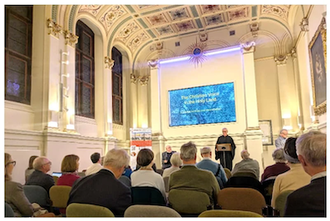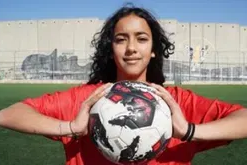'The Voice of Christians in the Holy Land: A Catalyst for Hope and Reconciliation'

Source: Friends of the Holy Land
More than 30 friends and supporters of Friends of the Holy Land (FHL) gathered at Farm Street Church, London, on 16 October and a further 50 people online via livestream for an evening of reflection, dialogue, and inspiration entitled 'The Voice of Christians in the Holy Land: A Catalyst for Hope and Reconciliation.'
The evening sought to illuminate the lived reality of the Christian community in the Holy Land today - a community small in number yet immense in spiritual significance.
The guest speaker, Rev John M Paul SJ (better known as Fr JP), Rector of the Tantur Ecumenical Institute in Jerusalem, offered an extraordinary first-hand insight into their witness, their suffering, and above all, their enduring hope. The evening was hosted and moderated by Brendan Metcalfe, CEO of Friends of the Holy Land.
The event left a deep impression on all who attended. Fr JP's words reminded everyone that while the Christian presence in the Holy Land may seem small, it is vibrant, essential, and prophetic. Through their endurance, compassion, and unwavering hope, these communities stand as living witnesses to the possibility of peace.
He left those gathered with a challenge as well as an invitation - that all who have heard their story share in this responsibility: to uphold the Christian presence in the Holy Land, to amplify its voice for justice and reconciliation, and to walk beside those who continue to hope where hope is hardest to find.
We are pleased to share key highlights of the event and some of Fr JP's insight below.
An 'Agent of Change' through Encounter
Fr JP began by situating his own ministry at Tantur Ecumenical Institute, a centre established by the Vatican to promote dialogue, study, and research at the crossroads between Jerusalem and Bethlehem. An oasis where people can encounter the sacredness of others' faiths, traditions, and places - a rare space of encounter in a divided landscape.
He explained that the mission of Tantur can be summarised in three images:
- a Crossroads, where the paths of East and West, Catholic and Orthodox, Christian, Muslim, and Jew meet;
- a Lighthouse, shining as a sign of unity in the midst of diversity, of communion rather than uniformity;
- a Bridge, of understanding, fellowship, reconciliation, communication - linking people and perspectives that otherwise might never meet.
Tantur creates create spaces where dialogue heals division, where faith becomes a bridge rather than a barrier, and where peace can be imagined anew. "We strive to be agents of change through encounter".
Christians in the Holy Land: A Small but Vital Presence
Fr.JP reminded the audience that Christians make up less than 2% of the population in the Holy Land. Despite this numerical fragility, their presence carries immense spiritual weight.
"We are not an imported faith," he said. "Christianity was not shipped here from Europe. We are part of the soil, part of the history, part of the living story of this land for two thousand years."
He described the wide diversity of Christian traditions in the region - Orthodox, Catholic, Armenian, Maronite, Syriac, Coptic, Ethiopian, Anglican, Lutheran, and Evangelical - each with its own liturgy and language, yet all united in the confession of Christ's name.
Fr JP turned to one of the most powerful symbols of the region - the Olive Tree.
"The olive tree is an enduring image of hope, endurance, and survival. Its trunk is gnarled, bruised, battered by wind and sun, yet its branches still bear fruit. Even when cut down, its roots send out new shoots. That is the Christian story in the Holy Land - wounded yet alive, scarred yet fruitful."
The Many Challenges and Struggle Beyond the Battlefield
Fr JP went on to outline the political, economic, and psychological challenges that define daily life in the region.
"The war traumatises everyone. It is not just armed conflict - it is a war for control: of territory, of ideology, of narrative."
He described the growing restrictions on visas for clergy, the financial pressures placed on Christian institutions through new taxation measures, and the increasing frequency of anti-Christian acts:
"We have seen priests spat upon in the street, seminarians escorted by police for their safety, churches desecrated, cemeteries vandalised, statues broken and too often, no one is held accountable."
In Gaza, he reported, "entire Christian families have been displaced multiple times - told to move to 'safe zones' that turn out to be anything but safe. Schools, hospitals, churches have been targeted or damaged. There is nowhere to hide."
He then turned to the West Bank, describing a tense and deteriorating situation marked by violence and insecurity. "Across the West Bank, radical settlers and ultra-nationalist groups are attacking Palestinian and Bedouin villages with growing impunity. Entire communities live under threat of expulsion and annexation. Many ask whether we are witnessing another Nakba - another displacement of families who have lived on this land for generations."
He explained that the daily pressures - roadblocks, land seizures, restricted movement - corrode hope and deepen isolation.
Fr JP then invited the audience to consider the deeper spiritual and human struggle beneath the political headlines.
He drew from the prophet Habakkuk: "We cry out, How long, O Lord? Are you listening? But the prophet answers, Wait for the vision, for it will not disappoint."
This waiting, he explained, is not passive resignation but active faith - the courage to hope when everything seems lost.
He spoke of the "spiritual-emotional-psychological yo-yo" experienced by so many: periods of fragile calm followed by renewed outbreaks of violence.
For many Palestinians, every promise of peace seems to crumble into more war. People live in constant tension, unable to plan for tomorrow. "What is our future? What is the future of the Church here?"
At the same time, he acknowledged "a moral fatigue" among Israelis who oppose the extremism within their own society: "They ask, 'Is this who we are? Are we still the people of the covenant of justice?'"
Turning to history, Fr JP lamented the widespread ignorance or distortion of the region's past, hearing claims that the Palestinians are a modern invention, or that Christianity was imported by the British. But, the roots of Christianity are here, and they run deep.
Finally, he commented on the impact of education systems shaped and controlled by political agendas.
Signs of Hope: Faith that Builds the Future
Amidst these dark realities, Fr JP emphasised that hope is not absent.
He pointed to Bethlehem Bible College and the Sabeel Ecumenical Centre as beacons of bold faith, nurturing young leaders and speaking courageously for justice. He praised Rabbis for Human Rights and Standing Together, Jewish organisations working for equality and mutual understanding.
He reminded us that God's promise is larger than any ideology. As Julian of Norwich told us: 'All shall be well.' It is not naïve to believe this; it is the only way to live.
He also drew attention to the growing international awareness of the plight of Christians, the recent recognition of Palestine and to the increasing number of nations willing to challenge policies that perpetuate division. While these are very important steps, he also emphasised the need for greater commitment to peace and to a call to action, to solidarity, to building a future.
A Christian Vision for Reconciliation
In the closing part of his talk, Fr JP reflected on the leadership of Cardinal Pierbattista Pizzaballa, Latin Patriarch of Jerusalem. He quoted the Patriarch's appeal to rediscover "the language of reconciliation" and to ask anew: "What is our Christian vision for the Holy Land?"
Fr JP reminded us:
"We are part of the history of this land - not imported observers. We are in the middle of something and have been for two thousand years. We have a stake in what happens in the Holy Land - in its present and its future. We also have a perspective that matters: a spirituality of dialogue, of bridging gaps; a vocation to be mediators for peace, forgiveness, and reconciliation - not supporters of violence as a means."
He continued: "We are educators - a voice that raises objection to the distorted narratives about Land, Covenant, and Scripture."
In a society where small minorities often rule with strong views and a loud voice:
"Christians too have a voice, and it needs to be heard: a voice for human rights, for justice rooted in faith, for the dignity of the human person, for Gospel values and bridges of understanding - a reconciliatory voice."
"And importantly a voice crying out in the wilderness: Prepare the way of the Lord."
Following the talk, a thoughtful Q&A session allowed participants to engage with Fr JP directly.
Brendan Metcalfe concluded the evening by highlighting the work and impact of Friends of the Holy Land - as a tangible way for Christians in the UK to respond and supports brothers and sisters in the region at this critical time.
We are grateful to Fr JP for his presence and heartfelt witness - and for reminding us that we each share responsibility for sustaining the Christian presence in the Holy Land and for standing alongside those who keep hope alive amid hardship.
LINK
Become a Friend of the Holy Land: www.friendsoftheholyland.org.uk/forms/register


















